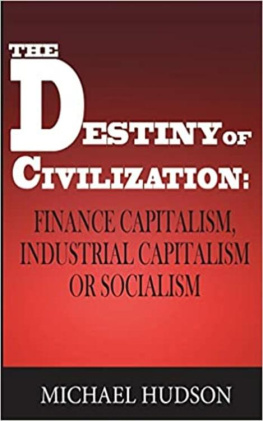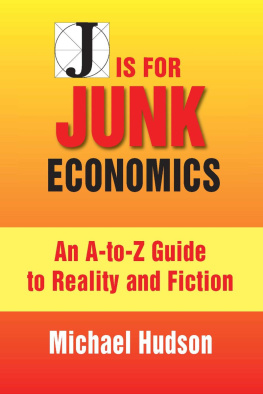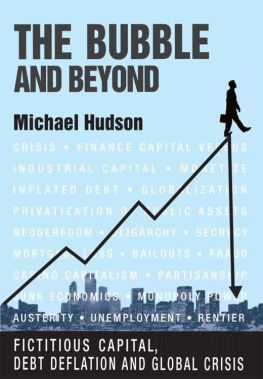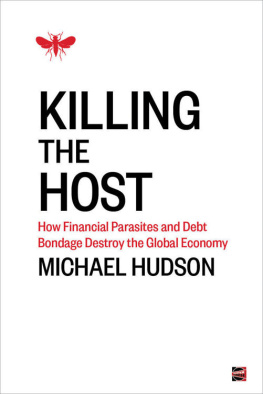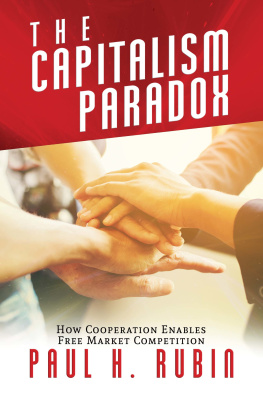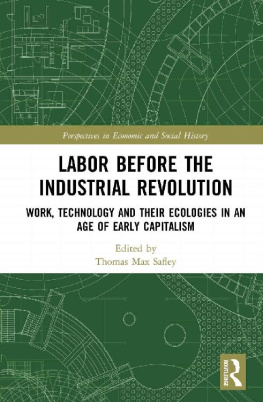Foreword by Wen Tiejun
Humanity Shares a Common Prospect: Barbarism or Ecological Civilization
The most important factor affecting the global economy is the increasing strain caused by U.S. hegemony. Its diplomacy has shaped the economic and trading rules enforced by the IMF, World Bank and other international institutions in Americas favor after World War II. U.S. leadership reached its peak with its Cold War victory over the Soviet Union in 1991, consolidated by increasingly aggressive military diplomacy over the next twenty years. But since 2008 this U.S. diplomacy has become so aggressive that it is now self-destructive, driving other nations out of the U.S. orbit, leading Americas international influence to fall increasingly short of its ambition to siphon off the worlds income and wealth for itself despite its own weakening economic power.
The principal conflict in todays world is between the United States and China. This book by Professor Hudson explains this conflict as a process of international transformation, above all in the sphere of economic systems and policy. He explains why the U.S.-China conflict cannot simply be regarded as market competition between two industrial rivals. It is a broader conflict between different political-economic systemsnot only between capitalism and socialism as such, but between the logic of an industrial economy and that of a financialized rentier economy increasingly dependent on foreign subsidy and exploitation as its own domestic economy shrivels.
Professor Hudson endeavours to revive classical political economy in order to reverse the neoclassical counter-revolution. The essence of 19th-century political economy was its conceptual framework of value, price and rent theory. Its idea of a free market was one free from economic rentdefined as the excess of market price over intrinsic cost-value, and hence unearned income. The classical aim was to free markets from landlords, monopolies and creditors. Yet the reverse has occurred in the West, particularly since the globalization of neoliberal policies in the 1980s.
Historically, the way for industrial nations to gain wealth and power was to make their government strong enough to prevent a landlord class from dominating, and indeed to suppress the rentier sector as a whole. To promote industrial prosperity, governments provided public services to reduce the costs of living and doing business. Basic services were provided at subsidized prices that would have been replaced by exploitative monopoly prices if key public infrastructure were turned over to private owners.
Economically, the most important service that all economies need to function smoothly is the provision of money and bank credit. When privatized, it becomes a rent-extracting choke point. That is why 19th-century economists developing the logic of industrial capitalism concluded that money and banking needed to be a public utility, so as to minimize financial overhead unnecessary for industrial production.
Todays anti-classical economics regards financial charges as income earned productively by providing a service, which is categorized as output and hence part of Gross Domestic Product (GDP). That statistical methodology treats financial profits, along with other forms of economic rent, as additions to GDP, not as an overhead burden. This produces an illusion that the real economy is growing. But what actually is growing is the rentiersector, which does not create real economic value, but merely transfers income from debtors, renters and consumers to creditors, landlords and monopolists. This rentier takeover is achieved by privatizing the public sector to create rent-extracting means for monopoly capital, organized mainly by the financial sector.
This book by Professor Hudson is based on the lecture series on finance capitalism that he presented for the Global University for Sustainability. The series is directed towards the Chinese audience because he believes that Chinas mixed economy with its classical industrial policy has best succeeded in avoiding the neoliberal American disease. These lectures explain why the U.S. and other Western economies have lost their former momentum: A narrow rentier class has gained control and become the new central planner, using its power to drain income from increasingly indebted and high-cost labor and industry. The American disease of de-industrialization has resulted from the costs of industrial production being inflated by the economic rents extracted by this class under the system of financialized monopoly capitalism that now prevails throughout the West.
The policy question for China is how it can best maintain its advantage and indeed, avoid falling prey to American ideological and diplomatic pressure. Professor Hudson summarizes his prescription as follows: First, national statistics should distinguish the productive sectors that create real value from the financial rentier sectors that merely transfer income from the rest of the economy to themselves. A transfer payment is not production. Second, all successful economies have been mixed economies. Money and credit, land, public services and natural resources should be controlled by the government so that they can be provided at cost or on a subsidized basis, thereby lowering the cost of living and doing business in the private sector. Third, the way to prevent unproductive debt overhead is to tax away economic rent so that it will not be financialized and paid out to banks as interest by speculators and buyers of rent-extracting opportunities.
A central point of Professor Hudsons analysis is that U.S. diplomacy is an extension of the neoliberal ideology sponsored by its rentier oligarchy. U.S. exceptionalism means that the United States can ignore international laws, dictate the policies of other countries, and demand that they relinquish control of potential rent-yielding assets (Such as banking, mineral-resource extraction rights, and high-technology monopolies) to U.S. multinational corporations and those of U.S. economic satellites.
For nearly the entire 75 years since World War II, pro-creditor laws have been imposed on all nations within the U.S. diplomatic orbit. This U.S. drive has imposed austerity on Global South countries when they have not been able to pay their dollarized debts, sacrificing their domestic economy and the well-being of their people to pay foreign bondholders.

